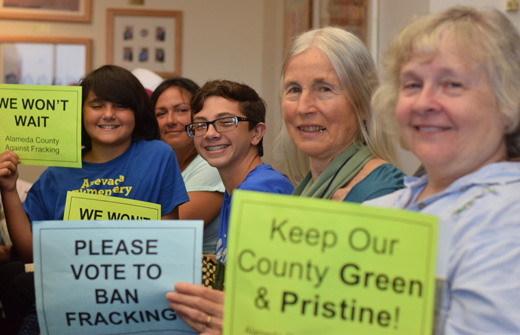
OAKLAND, Calif.- “We’re ecstatic. It’s historic!” an exuberant Ella Teevan told the People’s World Tuesday evening after the Alameda County Board of Supervisors unanimously voted to ban fracking for oil and natural gas in the county.
Teevan, the Northern California organizer for “Food and Water Watch” and a leader of the Alameda County Against Fracking (ACAF) coalition, said Alameda is the first of nine Bay Area counties to bar fracking.
Fracking, short for hydraulic fracturing, is a method of oil and natural gas extraction that involves blasting huge amounts of water, mixed with sand and toxic chemicals, under high pressure deep into the earth. It’s been proven to pollute local air and water, endanger human health, and contribute significantly to greenhouse gas emissions causing climate change.
Carolyn Bowden, organizer for the California Nurses Association, told the Alameda County supervisors that “nurses see every day the debilitating effects of diseases like asthma, heart disease and cancer” on workers and communities exposed to elevated levels of pollution generated by the extraction (especially through fracking), processing and burning of fossil fuels.
“We must protect workers, communities and the environment,” declared Bowden. “This is not just a political issue; this is a life and death issue.”
Judging by the crowd’s prolonged applause and whoops, Bowden hit a high note when she declared, “There is only one solution: leave it (fossil fuels) in the ground!”
A large crowd participated in the supervisors’ hearing July 18, among them activists and leaders affiliated with the ACAF coalition, which includes environmental, labor, business and health care groups as well as concerned county residents.
Quanah Parker Brightman, Executive Director of United Native Americans, appealed to the supervisors to “recognize the California indigenous nations’ senior water and mineral rights” by voting to ban fracking.
In addition to causing serious illnesses, Brightman said fracking greatly “contributes to the global climate crisis…that endangers our children and our families.”
Eight-year-old Sierra brought the house down when she told supervisors that we should not have to worry about “what to drink and what not to drink,” when the toxic chemicals used in fracking can find their way into our drinking water supply.
Alameda County has one drilling company operating out of the city of Livermore which does not employ the fracking method.
However, Alameda could possibly have considerable oil reserves because part of the county is near the Monterey Shale, one of the largest reservoirs of frackable oil in the country, according to the San Jose Mercury News.
Alameda joins five other California counties that have already banned fracking – Los Angeles, Santa Cruz, San Benito, Mendocino and Butte.
As more counties join the anti-fracking campaign, it is likely to increase pressure on Democratic Gov. Jerry Brown who has so far refused to give in to demands for a statewide ban on hydraulic fracturing.
Unlike his fellow Democratic Governor Andrew Cuomo, who decided to allow a statewide fracking ban in New York, Gov. Brown has opted for tightening regulations on fracking in California.
Despite his intransigence on a fracking ban, Gov. Brown, along with the Democratic majority with a relatively progressive leadership in the state legislature, has helped put California in the lead of efforts to reduce the emission of greenhouse gases.
Last year, the governor signed into law a bill, SB-350, requiring state-regulated utilities to increase by 50 percent the electricity generated from renewable energy sources, such as solar, wind and geothermal power, by 2030.
The bill also mandated a 50 percent increase in energy efficiency in buildings by the same year.
The original version of SB-350 included a mandate to cut the state’s consumption of petroleum by 50 percent by 2030.
The petroleum part of the bill came under fierce attack by Big Oil including an aggressive publicity and lobbying campaign, greased with generous campaign contributions to a number of conservative Democratic legislators representing districts with a more conservative electorate. After the state Senate passed the original bill, 20 of these conservative Democrats ganged up with the Republican minority to strip the bill of its petroleum mandate.
There have also been calls on the Obama administration to ban fracking on federal lands.
Instead of a ban, the Obama administration’s Bureau of Land Management (BLM) last year moved to regulate hydraulic fracturing on public lands.
However, in a ruling last month Wyoming-based District Court Judge Scott W. Skavdahl blocked the BLM’s detailed standards for the construction of oil and gas wells on federal and tribal land, in favor of the oil industry and several Republican controlled state governments that challenged the Obama administration’s regulation.
Although it applied only to public federal land under BLM’s control, it was seen as a model for states as they regulate drilling on private lands, according to Bloomberg media.
This decision comes on top of the Supreme Court stay of the Clean Power Plan that requires states to cut carbon dioxide emissions from power plants, among other federal court rulings blocking the Obama administration’s environmental agenda.
Although the administration vows to continue to fight these adverse environmental court rulings, in the final analysis everything depends on the outcome of the November elections.
At play is the presidency, the Senate and the House of Representatives as well as the Supreme Court, which is now evenly split between conservative and liberal justices.
Whether Republicans or Democrats come out on top in the presidential and Senate races will most likely determine whether the nation will get a conservative or a liberal justice to fill the ninth tie-breaking Supreme Court seat vacated when right wing Justice Antonin Scalia died earlier this year.
Much hinges on the outcome of the November elections. The election may be one of the biggest challenges facing the anti-fracking coalitions, as well as the overall struggle to drastically cut the emission of greenhouse gases, and adherence to and improvement of last year’s Paris international climate accord.
Photo: Ella Teevan, Food & Water Watch












Comments